Why are some cats obsessed with going outside? Cats are naturally attracted to outside places, and sometimes, they can’t help their evolutionary urge to go outside to protect their territory, look for prey, or even a mate.
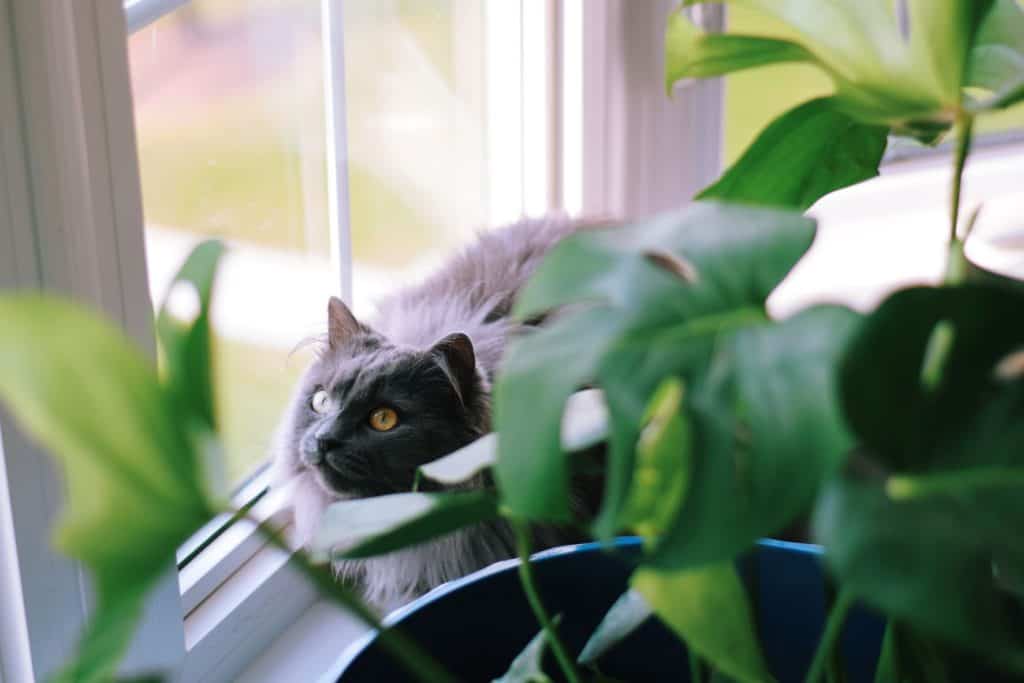
Every cat home is different, some cats can go outside once or twice a day, and others prefer to be just out forever, sometimes only popping inside once a week! However, more and more people opt to have their cats be indoor-only, either because of the cat’s condition or the surrounding environment not being safe enough for cats. Therefore, if these cats get a chance to go outside, it’s incredibly problematic for their owners.
As much as we want the best for our feline friends, they, unfortunately, can’t understand our good intentions. If your cat has obsessively been looking for ways to get outside or constantly meowing/getting your attention to get you to open the door, cat owners will have to devise some ways to keep them inside.
Are All Cats Obsessed With Going Outside?
Most domesticated/house cats prefer to stay in their comfort zones or territorial bubble. Therefore, most of the time, domestic cats really don’t desire to go anywhere else. However, if there are times when a cat does get a chance to access the outdoors, they are likely to ask for it again constantly (through meowing or scratching at the door) unless there’s a proper routine or strategy.
Of course, this isn’t very pleasant for both the cat and their humans.
Why Do Some Cats Want to Escape Their Home?
The will to go outside and participate in hunting, cat-fights, and searching in trash boxes are innate in cats. Although cats have become quite civilized during their evolutionary history, they can’t get over their hereditary wild nature.
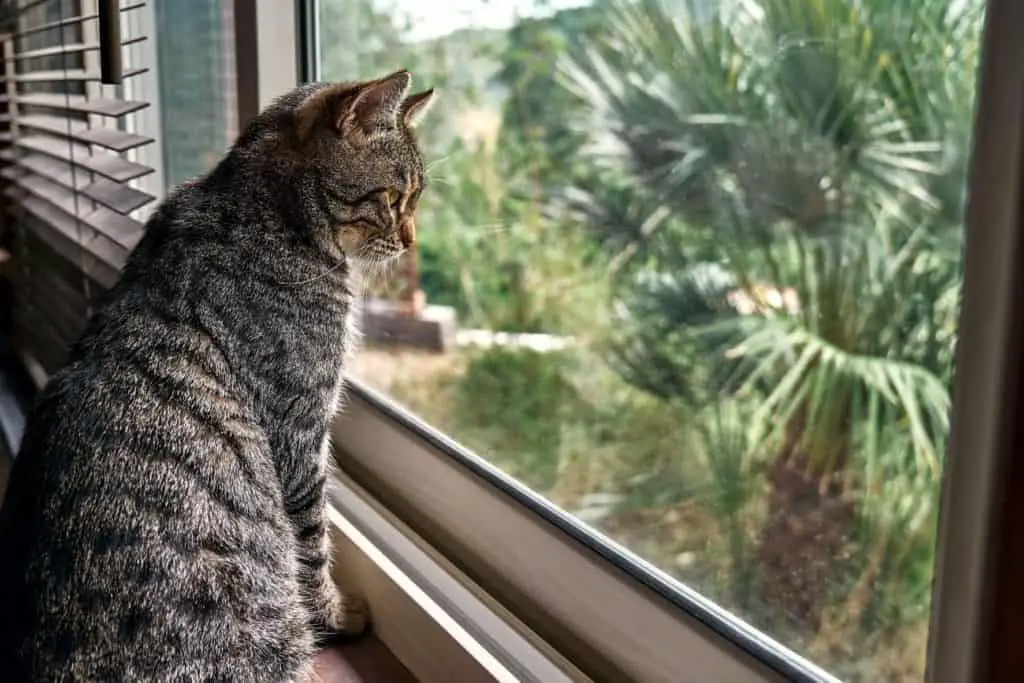
Here are the top reasons why your cat wants are tempted to dart outside:
- Cats are natural hunters. They are crepuscular or semi-nocturnal creatures who are most active in the dark, i.e., at the time of dawn or dusk. You can’t imagine how wild your pampered housecat can be for poor rodents. These felines often leave home at night and give you a morning surprise of some dead mouse lying on the table. No matter how much you feed them, their genetic urge for hunting can’t be curbed.
- Cats are very much protective about their territory. The home they live in and the outside places they visit can constitute their territory. They are very careful of who or what goes into their territory (especially not other cats). This is why cat introductions are quite difficult. Most cats can patrol within half a mile of their actual living place. Male cats dominate an area of around 1500 feet, while females rely on about 75 yards.
- Like any other animal, cats start looking for mates as soon as they reach reproductive age. Their instinct for mating makes them go outside and search for partners. Female cats look for mates while staying in their territory. At the same time, males can go far beyond their territorial space to satisfy their instinct.
- Your little cuddle bug has a strong desire to explore the unknown. The cats love to sun themselves. They want to search for new cozy warm places and food sources. They like to sniff the grass and play with old tires and any toys they find in the open places. Not often, but sometimes they are also looking for some new friends to play with.
How to Stop Cats from Escaping Home?
It is clear that some cats desire to go out to satisfy some of their innate desires. But as cat parents, we must be aware of this behavior and implement strategies to change their habits and routines slowly. Here are some essential steps to take to stop your cat’s constant urge to go outside:
1. Neuter or Spay Your Feline
For most cats, a lot of the desire to go outside is from hormonal behavior from being intact. Therefore, ensuring that your cats are neutered or spayed is very important. Sometimes, there are conditions of a “hidden” or retained testicle in the abdomen for male cats.
As a result, even though he might already be neutered, the retained testicle can still produce enough hormones to affect his behavior (either aggressiveness or the urge to go outside and mate).
2. Deter or Make the Escape Unpleasant
Making the escape routes difficult and unpleasant will divert your cat’s attention from the idea of escaping. You can spread aluminum sheets on the exits as these pets find them irritable. Also, cats don’t like citrus smells, so spreading around these scents can be used.
For those cats that love to scratch doors and make noises, putting some large double-sided sticky tape on the doors will stop that behavior almost immediately. Below is a list of all the recommended behavior-altering cat supplies that don’t negatively affect your relationship with your cats.
3. Bring Some of the Outside, In
For cats that have always enjoyed the outdoors, it’s best to think about what they like from the outside. Some cats love plants and grass, while others love to climb trees and bask in the sun. As cat parents/butlers, we should be able to create some alternatives to find that same comfort inside.
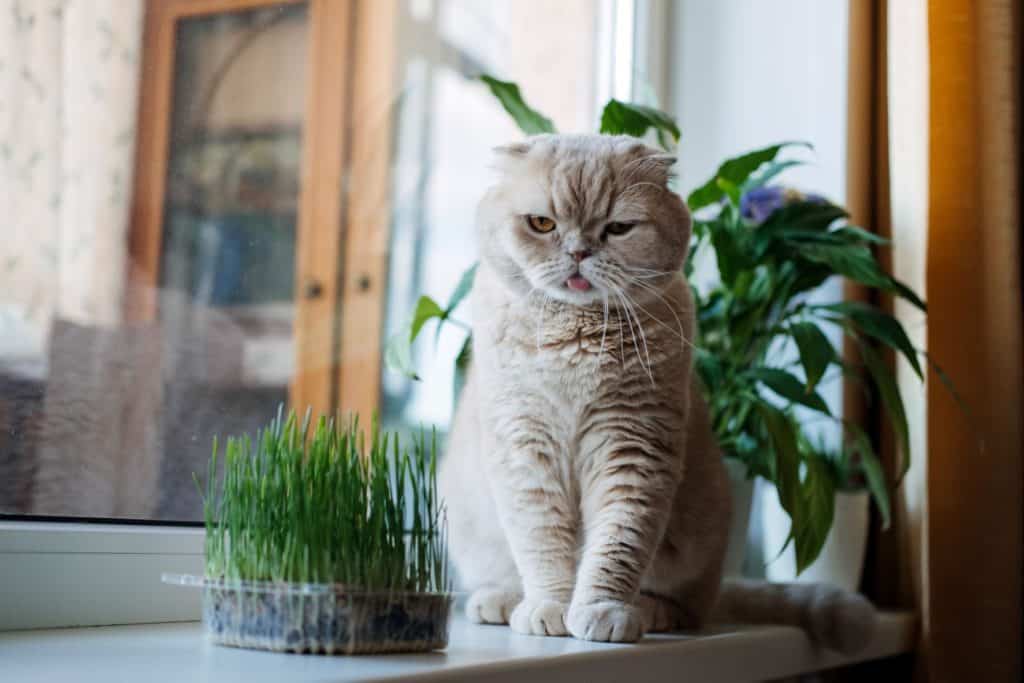
For example, a cat hammock near the window can provide a nice view and warmth from the sun. It’s possible to create a whole catified space using only cat suction cup hammocks/perches too! Additionally, finding and growing cat-friendly plants for cats that love grass or plants will also help with boredom indoors.
4. Controlled Outdoor Access
Depending on where you live, this might not be possible. Still, for those with either balconies, terraces, or porches, making these areas cat-escape-proof could be an excellent alternative option by still allowing them some access but only in a small area.
Additionally, it can be good to obtain a harness and start leash training for some super-high energy cat breeds such as the Bengal cat. Just be sure to either microchip or have collars with home addresses imprinted on them.
Is It OK To Let Cats Go Outside If They Meow or Scratch?
In a one-word answer, no. Not only does it teach your cat terrible habits (in which they will undoubtedly repeat these actions in the future), but it is completely unsafe and unhealthy for your cats to stay outside of their home for extended periods. Additionally, frequent contact with other cats and animals outdoors will have your cat be at risk of getting sick, contracting diseases, or infections!
Hundreds of cats roaming on the streets are hit by automobiles each day. Moreover, your pampered cats become prone to savage wild fights with outdoor cats. An indoor cat is never ready to face the hardships of outdoor life. Due to higher risks and injuries, an outdoor cat lives for almost 2-5 years against indoor cats’ 15-17 years long lifespan.
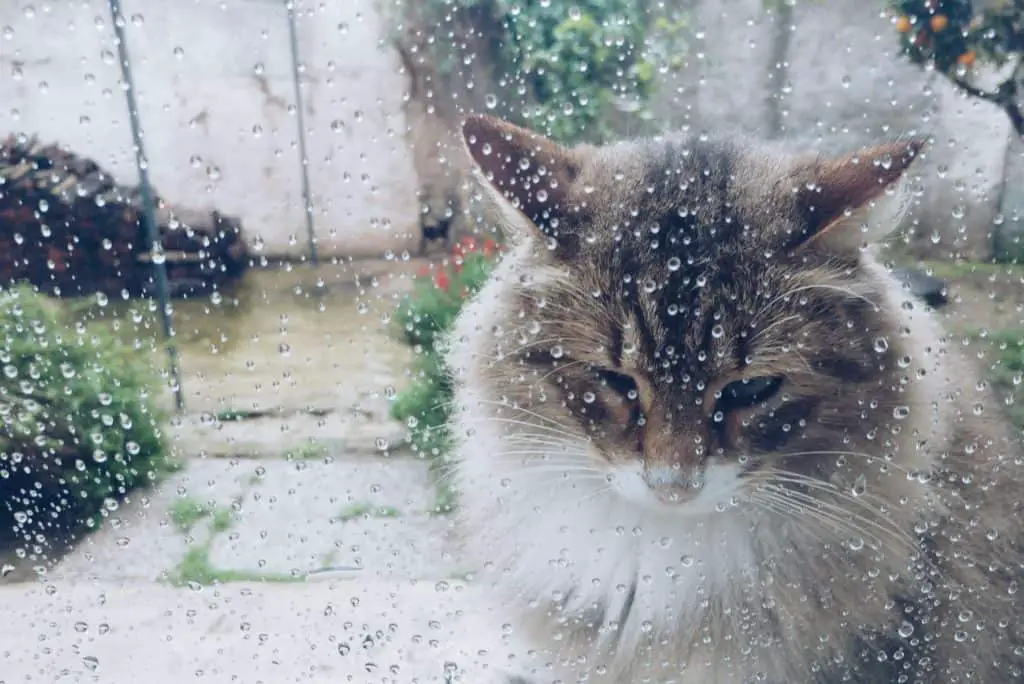
Suppose your cats continue to scratch or meow to try to get outside, even after implementing these instructions. One of the best ways to stop a cat from doing something is to ignore them completely (don’t even look at them). While it might be hard to do with the noise they might make, some noise-canceling headphones or earplugs might do the trick. After realizing they will not get what they want, they’ll lose interest.
Conclusion & Recommended Supplies
Give your felines some alternatives in the home to divert their attention from outdoor places. Make the pathways leading outside difficult to cross by using cat repellents. Neuter your felines, take protective measures, train them properly, and you are good to go.
 Sticky Paws Pet Sticky Roll
Sticky Paws Pet Sticky Roll
When push comes to shove, this can be a good tool to our teach cats what areas are unacceptable to be on. This is for people that don't want certain furniture to be scratched up and for stubborn cats that are set in their ways scratching up a certain type of furniture or material.
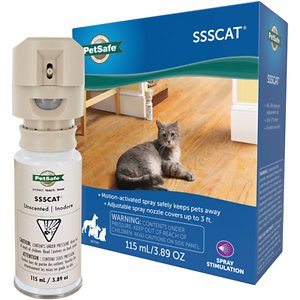 PetSafe SSSCAT Motion-Activated Dog & Cat Spray
PetSafe SSSCAT Motion-Activated Dog & Cat Spray
The PetSafe SSSCAT Deterrent Cat Spray easily protects indoor areas and objects from your pets. This unique spray uses motion-activated infrared to monitor movement up to 3 feet away. When the SSSCAT detects your pet entering an off-limit area, it emits a harmless, odorless, and stainless spray to deter your pet from continuing.
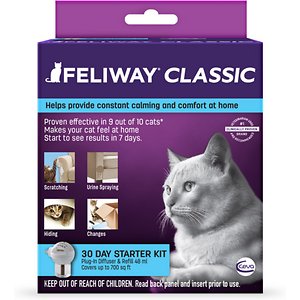 Feliway 30 Day Starter Kit
Feliway 30 Day Starter Kit
Feliway is a synthetic copy of the feline facial pheromone, used by cats to mark their territory as safe and secure. By mimicking the cat’s natural facial pheromones, Feliway creates a state of familiarity and security in the cat's local environment. As a result, Feliway can be used to help comfort and reassure cats while they cope with a challenging situation and help prevent or reduce the stress caused by a change in their environment.
